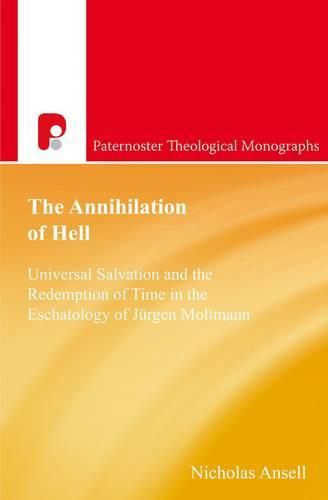Readings Newsletter
Become a Readings Member to make your shopping experience even easier.
Sign in or sign up for free!
You’re not far away from qualifying for FREE standard shipping within Australia
You’ve qualified for FREE standard shipping within Australia
The cart is loading…






This title is printed to order. This book may have been self-published. If so, we cannot guarantee the quality of the content. In the main most books will have gone through the editing process however some may not. We therefore suggest that you be aware of this before ordering this book. If in doubt check either the author or publisher’s details as we are unable to accept any returns unless they are faulty. Please contact us if you have any questions.
This work analyses and evaluates Jurgen Moltmann’s model of universal salvation and its relation to his understanding of the redemption, or eschatological fulfilment, of time.
For Jurgen Moltmann, Hell is the nemesis of Hope. The ‘Annihilation of Hell’ thus refers both to Hell’s annihilative power in history and to the overcoming of that power as envisioned by Moltmann’s distinctive theology of the cross in which God becomes ‘all in all’ through Christ’s descent into Godforsakenness. The negation of Hell and the fulfilment of history are inseparable. Attentive to the overall contours and dynamics of Moltmann’s thinking, especially his zimzum doctrine of creation, his eschatologically oriented philosophy of time, and his expanded understanding of the nature-grace relationship, this study asks whether the universal salvation that he proposes can honour human freedom, promise vindication for those who suffer, and do justice to biblical revelation. As well as providing an in-depth exposition of Moltmann’s ideas, The Annihilation of Hell also explores how a ‘covenantal universalism’ might revitalise our web of beliefs in a way that is attuned to the authorising of Scripture and the spirituality of existence. If divine and human freedom are to be reconciled, as Moltmann believes, the confrontation between Hell and hope will entail rethinking issues that are not only at the centre of theology but at the heart of life itself.
$9.00 standard shipping within Australia
FREE standard shipping within Australia for orders over $100.00
Express & International shipping calculated at checkout
This title is printed to order. This book may have been self-published. If so, we cannot guarantee the quality of the content. In the main most books will have gone through the editing process however some may not. We therefore suggest that you be aware of this before ordering this book. If in doubt check either the author or publisher’s details as we are unable to accept any returns unless they are faulty. Please contact us if you have any questions.
This work analyses and evaluates Jurgen Moltmann’s model of universal salvation and its relation to his understanding of the redemption, or eschatological fulfilment, of time.
For Jurgen Moltmann, Hell is the nemesis of Hope. The ‘Annihilation of Hell’ thus refers both to Hell’s annihilative power in history and to the overcoming of that power as envisioned by Moltmann’s distinctive theology of the cross in which God becomes ‘all in all’ through Christ’s descent into Godforsakenness. The negation of Hell and the fulfilment of history are inseparable. Attentive to the overall contours and dynamics of Moltmann’s thinking, especially his zimzum doctrine of creation, his eschatologically oriented philosophy of time, and his expanded understanding of the nature-grace relationship, this study asks whether the universal salvation that he proposes can honour human freedom, promise vindication for those who suffer, and do justice to biblical revelation. As well as providing an in-depth exposition of Moltmann’s ideas, The Annihilation of Hell also explores how a ‘covenantal universalism’ might revitalise our web of beliefs in a way that is attuned to the authorising of Scripture and the spirituality of existence. If divine and human freedom are to be reconciled, as Moltmann believes, the confrontation between Hell and hope will entail rethinking issues that are not only at the centre of theology but at the heart of life itself.